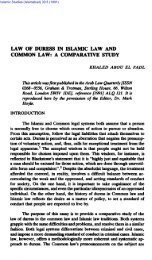You also want an ePaper? Increase the reach of your titles
YUMPU automatically turns print PDFs into web optimized ePapers that Google loves.
And thus declared that Arab lady:"<br />
It might however be noted that the Chronicle of King<br />
Solomon and Queen Sheba had two versions. There is the Jewish<br />
version of the Qed Tutizment in the 'book of the Kings.' The other<br />
version is of course the Arabic source. The character of Solomon<br />
which yeats portrayed in these two poems is based on the Arabic<br />
source, Yeats sees Solomon as one:<br />
Who understood<br />
'Whatever has been said, sighed, sung,<br />
Howled, maiued+x barked, brayed, belled, yelled, cried<br />
crowed* '@<br />
The lines above stress that Yeats depicted Solomon's figure in<br />
accordance with the Arabic tradition, which states that Solomon<br />
understood and spoke the language of all birds and beasts and he<br />
held dominion over all the jinn. This is firmly stated in the Holy<br />
Qur'Zin. In two different places on reads:<br />
And Solomon was David's heir<br />
He said: "0 Ye people!<br />
We have been taught the speech<br />
Of Birds and on us<br />
Has been bestowed (a little)<br />
Of all things: this is<br />
Indeed Grace manifest (from God)<br />
And before Solomon were marshalled<br />
His hosts - of Jinns and men<br />
And birds and they were all kept in order and rank<br />
(27:16-17) "<br />
However,<br />
The narrative of the Queen Sheba is a folk tradition and<br />
belongs to the story-tellers of the East, while the story of<br />
Solomon as told by Arab minstrels is entirely different from<br />
that given in the OPd Tmment, where in the first thirteen<br />
verses of the first '~ook of Kings' we read of a pious,<br />
wealthy and quite human King. Anyone familiar with the<br />
figure of Sulaymb ibn DZGd (Solomon the son of David) or<br />
Sulaym'n al-IjakTm (Solomon the wise) in Arabic folklore,<br />
notably in The Aaabian Night&, will not be surprised to find<br />
that the Solomon of the Arabs is a totally different man<br />
from that of the Jews.2c<br />
Yeats* poem 'The Second Comingq might implicitly suggest the<br />
christian belief in the return of Jesus. Here again the deep roots<br />
of the Arabic elements of Yeats' poetry are first detected when he<br />
symbolically uses a falconer and his falcon and the loss in<br />
communication between them to signify man's strides in breaking<br />
with his indigenous ties:
















